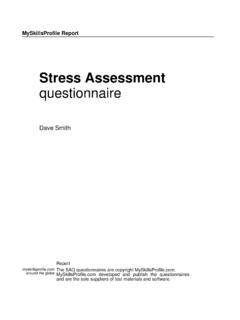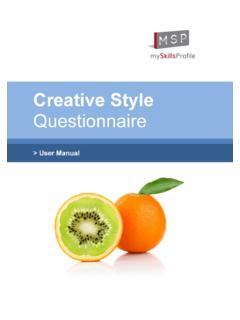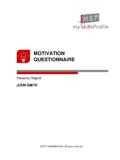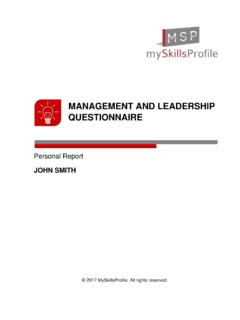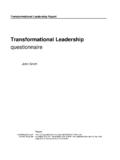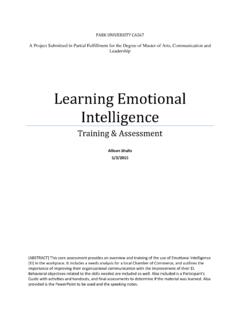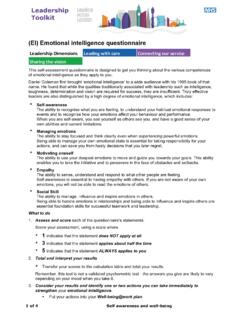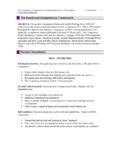Transcription of EMOTIONAL INTELLIGENCE QUESTIONNAIRE - MySkillsProfile
1 EMOTIONAL INTELLIGENCE QUESTIONNAIRE Personal Report JOHN SMITH 2017 MySkillsProfile . All rights reserved. SAMPLE REPORT 2 E EMOTIONAL INTELLIGENCE QUESTIONNAIRE Introduction The EIQ16 measures aspects of your EMOTIONAL INTELLIGENCE by asking you questions about your understanding of emotions and feelings as well as your attitudes and reactions in various situations. Groups of questions relate to different aspects of EMOTIONAL INTELLIGENCE called EMOTIONAL competencies. It is the particular combination of EMOTIONAL competencies possessed by a person that contributes to their uniqueness. Competencies are not the only influence on your individuality, however, as your personality, your particular talents, your interests, your values, your pattern of intellectual abilities, your life experience and your current life situation also contribute to making you the person you are.
2 Psychological tests do not measure the whole you which is why they need to be interpreted in the context of other information about you. Please bear the following points in mind as you consider the results from your assessment. First, your profile is based on what you have said about yourself through your responses to the QUESTIONNAIRE so that what we are measuring here is your own perception of what you are like. Second, the results can also be affected by your strategy for answering the QUESTIONNAIRE - whether this was conscious or unconscious - for example, whether you were very frank, whether you were very self-critical or whether you felt under pressure to convey a more than usually positive impression of yourself.
3 Third, this assessment is intended to help you clarify your view of yourself and help you to develop and achieve personal growth. If you do not recognize yourself in the following pages, check what other people think by taking views from bosses, peers and direct reports. Fourth, the report describes your level of competence in different areas of EMOTIONAL INTELLIGENCE by comparing your responses against those of a large international comparison group of managers and professionals. Your results are reported on a 10-point scale known as the Standard Ten (Sten) scoring system. The table below indicates what different Sten scores mean and how they should be interpreted.
4 Sten Percent Meaning Level Competence 8-10 15 Higher than average 5 Expert 7 15 High-average 4 Skilled 5-6 40 Average 3 Competent 4 15 Low-average 2 Consider developing 1-3 15 Lower than average 1 Improve SAMPLE REPORT 3 E EMOTIONAL INTELLIGENCE QUESTIONNAIRE Assessment Scales The EIQ16 has 16 scales that measure different aspects of EMOTIONAL INTELLIGENCE . Self-analysis This scale assesses the degree to which you are in touch with your feelings and emotions and notice when your mood changes. Analysis of others This scale measures the extent to which you pay attention to and identify other people's feelings and emotions. Self-expression This scale assesses how far you pick up on EMOTIONAL cues and can tell when something is wrong or when someone is trying to deceive you.
5 Discrimination This scale indicates how far you are able to describe and communicate your feelings and emotions. Thinking This scale reflects the degree to which you follow your hunches and feelings and let your feelings guide your thinking. Judgment This scale assesses the extent to which you allow your instincts and intuition to influence your judgments and decisions. Sensitivity This scale indicates the extent to which you are able to capitalize on mood changes in a positive way to explore and analyze things. Problem solving This scale assesses the extent to which you use your own and other people's feelings and emotions to help solve problems. Symptoms This scale measures your ability to recognize a range of common emotions - for example, happiness, anger, fear, surprise, interest etc.
6 Causes This scale shows how far you understand the factors that lead people to experience different feelings and emotions. Complexity This scale assesses the extent to which you understand complex feelings, EMOTIONAL blends and contradictory states. Transitions This scale indicates the degree to which you are aware of and can anticipate how emotions progress and change. Openness This scale measures the extent to which you stay open to pleasant and unpleasant feelings to help manage situations and events. Monitoring This scale assesses how far you are able to reflectively engage or ignore your feelings and emotions to help guide your actions. Self-control This scale assesses your ability to stay in control of your feelings and emotions when you are under pressure and stress.
7 Managing others This scale indicates the degree you are able to manage other people's feelings and emotions in a sympathetic manner. SAMPLE REPORT 4 E EMOTIONAL INTELLIGENCE QUESTIONNAIRE EMOTIONAL INTELLIGENCE Overall, you come out as Level 2 competence on EMOTIONAL INTELLIGENCE . Your responses to the QUESTIONNAIRE suggest that the development of EMOTIONAL skills and competencies has only been a moderately important driver for you up to now. Your total score is within the low average range of scores of the international comparison group. This indicates that EI is less likely to be one of your strengths. You are probably the type of person who feels more comfortable dealing with facts and information rather than feelings and emotions.
8 The remainder of the report describes your profile in more detail. Reading People EMOTIONAL INTELLIGENCE consists of four related abilities or competencies. The first of these is reading people - that is, identifying how you and those around you are feeling and being able to see how people are really feeling even when they may be putting on an outward show. This cluster of abilities also covers the ability to express emotions appropriately for the situation. A competent manager knows what people feel, will talk about feelings and can show how they feel. Your responses indicate that you are as competent as the average person in reading people's feelings and emotions.
9 Using Emotions This cluster of EMOTIONAL competencies is about using feelings and emotions to guide your thoughts and behavior. It means getting in the mood and using feelings and emotions to facilitate thinking, problem solving and decision making. The ability to use emotions can help you identify different scenarios and give you a different and enhanced perspective on issues in work and family life. It will help you see the world in different ways and appreciate other people's points of view. A skillful manager can feel what others are feeling and focuses on what's important when emotions are strong. Your responses indicate that you are less capable than the average person in this aspect of EMOTIONAL INTELLIGENCE .
10 You should consider improving your skills in this area. Understanding Emotions Understanding emotions will help you predict how people will react to different situations. This cluster of abilities is about developing a map of how emotions operate, about how one emotion can lead to another and result in a particular EMOTIONAL state. It covers understanding the warning signs of EMOTIONAL states such as boredom, apprehension and anger. When you possess an EMOTIONAL map, you will be able to deal more effectively with the ups and downs in your career and in your life. A competent manager knows how people will react to different situations and knows what to say and what to do to get the best from themselves and from other people.

